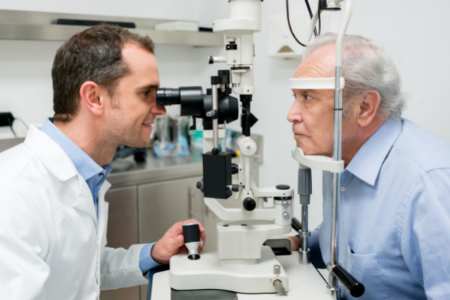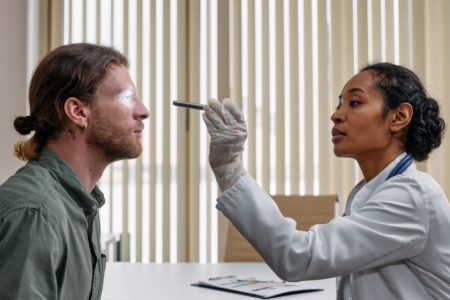- What’s the difference between an optometrist and an ophthalmologist?
- What qualities should I look for in an optometrist?
- What should I look for in an ophthalmologist?
There are more than 40,000 optometrists and 18,000 ophthalmologists practicing in the United States. What’s the difference between these two professions and what should you look for when choosing an eye doctor?
What’s the Difference Between an Optometrist and an Ophthalmologist?
 The biggest difference between an optometrist and an ophthalmologist is the training they receive. An optometrist receives specialized training to become an O.D., or Doctor of Optometry, and is not considered a medical doctor. An ophthalmologist, however, is a medical doctor specializing in the health and diseases of the eyes. While an optometrist can check the general health of your eyes and prescribe glasses or contacts, an ophthalmologist can perform surgery and treat diseases of the eye.
The biggest difference between an optometrist and an ophthalmologist is the training they receive. An optometrist receives specialized training to become an O.D., or Doctor of Optometry, and is not considered a medical doctor. An ophthalmologist, however, is a medical doctor specializing in the health and diseases of the eyes. While an optometrist can check the general health of your eyes and prescribe glasses or contacts, an ophthalmologist can perform surgery and treat diseases of the eye.
If you’re selecting an eye doctor, the first question to consider is whether you need an optometrist or an ophthalmologist. Usually, people will start with an optometrist and move on to an ophthalmologist if they encounter an eye problem. Think of an optometrist as kind of a primary care provider for your eyes. That doctor is a generalist in the health and well-being of your vision. They can test your vision and detect certain types of abnormalities. However, depending on the severity of your eye conditions, you may be referred to an ophthalmologist.
There are also opticians, who are not eye doctors and cannot give you eye exams. They typically get a one- or two-year certificate, and their job is to fill the vision prescription written by your optometrist.
What Should I Look for in an Optometrist?
 The most obvious criterion for selecting any eye doctor is based on your needs as the patient. If your goal is to have an annual eye checkup, it’s time to see an optometrist, who can test your eyes and prescribe glasses or contacts. If you’re having problems with your eyes beyond struggling to read fine print or seeing distances, you may need an ophthalmologist.
The most obvious criterion for selecting any eye doctor is based on your needs as the patient. If your goal is to have an annual eye checkup, it’s time to see an optometrist, who can test your eyes and prescribe glasses or contacts. If you’re having problems with your eyes beyond struggling to read fine print or seeing distances, you may need an ophthalmologist.
Your goal for both types of doctors should be the same: finding a skilled medical professional that you trust with your health.
How to Find the Right Doctor for Your Needs
First, seek recommendations. Talk with your friends and others in your social network to determine what their experiences have been with their eye doctor. Asking for a direct referral is a great way to find an eye doctor simply because the person making the referral is giving you a first-hand opinion of their experience with that professional. You can also look on medical review sites such as Healthgrades to see what other consumers of these services have experienced.
If you have vision insurance, also check to see which eye doctors are in your network. The benefit of these doctors is that not only will you receive a better rate overall, but your insurance carrier will reimburse you at a higher amount. Many vision plans cover routine annual exams with an approved ophthalmologist for no additional out-of-pocket costs. Check with your insurance carrier to find out the details of your particular plan.
Generally, you want a primary eye doctor to have good communication skills that help the two of you connect. You should feel very comfortable asking questions of any of your doctors, no matter their specialty. A good optometrist can easily explain the status of your vision, any problems you’re having, and work with you closely to develop a treatment plan, whether it’s a new set of glasses, dry eye drops, or something more serious that requires a referral to an ophthalmologist.
What to Do When You Get Referred to a Specialist
This brings up an important point. Many times, your optometrist will refer you to an ophthalmologist for a specific problem that requires more specialized care. This referral is usually based on a long-standing relationship between your primary optometrist and the specialty eye doctor. However, it’s okay for you to ask your optometrist why they’re referring you to a specific ophthalmologist.
Keep in mind, just because the optometrist suggests you see a specific doctor, you may find that it isn’t the right fit.
What Should I Look for in an Ophthalmologist?
 All of the same questions you ask before choosing your optometrist should also apply when considering an ophthalmologist:
All of the same questions you ask before choosing your optometrist should also apply when considering an ophthalmologist:
- What do friends, family, or other patients say about the ophthalmologist?
- Is the ophthalmologist covered by your insurance?
- Is the ophthalmologist a good communicator?
- Do you feel comfortable with this choice?
However, ophthalmologists have a big responsibility to treat a specific problem with your eyes, prescribing medications and even performing surgery to improve, repair, or treat illnesses. Take the time to research the credentials of the ophthalmologist to be sure they are board certified and in good standing with the American Board of Ophthalmology.
It’s also a good idea to make sure the ophthalmologist specializes in the particular condition that you’re experiencing. It’s fine for you to call their practice and speak with the front desk to find out more about the practice and the doctor’s experience. Just like any specialty medical provider, your ophthalmologist will have experience in one area or several and that expertise will help ensure you receive the highest quality of care.
In healthcare, or in any field, for that matter, experience matters. Finding an ophthalmologist that specializes in a specific treatment area means that the doctor takes special care to stay on top of the latest research and most innovative and effective treatments.
Can Miami Eye Help You Find the Right Eye Doctor?
Finding the right provider, no matter their area of specialty, matters for your health. At Miami Eye, we work hard to earn your trust and provide the highest quality care. Talk with our team today to find out why we’re the best choice for vision care in the area and how we can help you see clearly for all the stages of your life.

